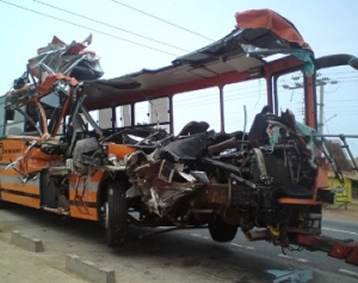VALD calls for pragmatic measures to reduce road accidents
 The Vision for Alternative Development (VALD), a road safety non-governmental organisation, has expressed worry over the rise in road crashes and deaths and said it is unacceptable.
The Vision for Alternative Development (VALD), a road safety non-governmental organisation, has expressed worry over the rise in road crashes and deaths and said it is unacceptable.
It said the situation was getting out of control despite the education by the National Road Safety Commission, civil society organisations and other relevant institutions.
The VALD, therefore, called on the Government to take pragmatic steps and actions on the country’s roads to save the more than 2000 lives that were lost every year and achieve the UN Decade of Action on Road Safety and the Sustainable Development Goals 3(6).
“Halving road deaths as contained in the UN Decade of Action by 2020 is becoming a rhetoric in Ghana,” it said.
This was in statement signed by Mr Labram Musah, the Programmes Director of VALD and the Coordinator for Ghana Non Communicable Diseases (NCD) Alliance and copied to the Ghana News Agency on Saturday.
It said the Commission must go beyond the normal seasonal interventions in December and April during Christmas and Easter respectively to more serious daily measures to avert the situation.
The statement said the Motor Transport and Traffic Directorate (MTTD) of the Ghana Police Service had revealed in a report that an average of six people died in road accidents every day in Ghana, which was blamed on irresponsible driving.
The MTTD report said a total of 592 people died in 3,193 road accidents across the country in the first quarter of 2018.
In addition 3,343 persons suffered injuries, while 792 pedestrian knock-downs were recorded during the crashes over the same period and that the deaths were highly preventable.
The statement said apart from various factors like speeding, wrong overtaking, overloading, drunk-driving, phone conversation/texting during driving, the condition of the road was a major contributory factor to the rising incidence of traffic deaths.
“Over the past years, efforts have been made by stakeholders to improve road safety but unfortunately the country’s performance remains poor compared to many other countries with similar socioeconomic characteristics.
“Most of our roads are without markings to aid easy access, traffic lights are virtually not in place or broken down, traffic wardens or security personnel are absent at many places, high level of indiscipline by drivers and many more are some of the things you come across every day on our roads,” it said.
The statement commended President Nana Addo Dankwa Akufo-Addo for his timely intervention to help salvage the situation, adding; “While we support the action by the President, we believe that only pragmatic strategies and steps can reduce the carnage on our roads.”
It said road safety targets had, over the years, been set by governments but yet to be achieved, which had been blamed on inadequate funds, adding that; “These excuses, we believe, are just to avoid being blamed for the problem.”
“Thankfully extra funds have been approved and we hope that new targets will be set together with proper planning mechanisms and monitoring framework to achieve the targets and ensure transparency and accountability,” the statement said.
It called for immediate action to be taken to improve road conditions and road user capabilities.
“Several countries have demonstrated how road safety standards can be improved through sustained effort and investment and the pay offs for these efforts have been exceptionally rewarding. While it is anticipated that road accidents cost Ghana some capitals, we can’t put cost on lives lost every day through our action and inaction,” the statement said.
It said strategic road policing and law enforcement, good engineering and education on behavioural change were best bet and urgently needed.
“As far as we are concerned the law enforcement agencies, especially the road police, need to first and foremost brace themselves with the national road traffic laws and regulations. Many offences are committed by drivers and the police look unconcerned primarily because they do not know it’s an offence or they do not have the tools to enforce them.
Practical examples are drink driving, no helmet and seatbelt (both drivers and passengers), distracted driving (talking/texting via mobile phone), children seating in front seats without seatbelts and so on.
The statement noted that; “It is important for us all to note that nothing is going to save us if the road is not maintained or built to meet the standard: almost all our roads are not up to standard and are not pedestrian friendly/protected.
“The N1, Madina through to Adenta Highway and many roads are virtually ignored, posing dangers to all road users. How much will it cost to build pedestrian crossing/footbridges to protect our children, parents and loved ones?
“How often do the passengers raise objections about speeding drivers? Can government or the Commission empower passengers to report recalcitrant drivers who are putting their life at risk? If so, how?”
Source: GNA
